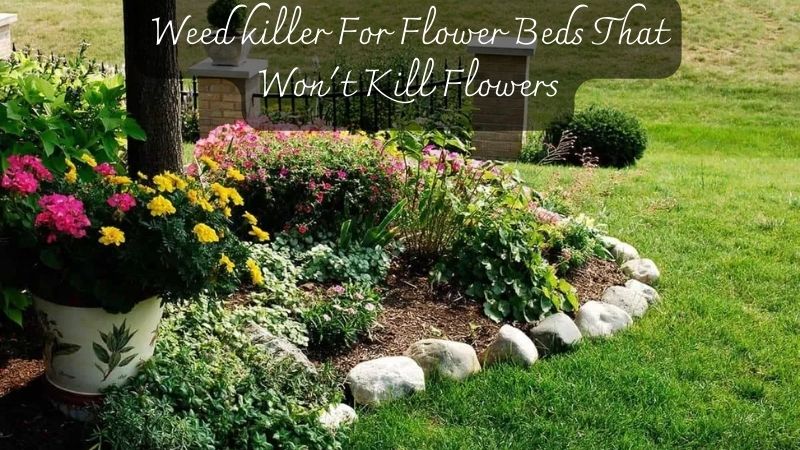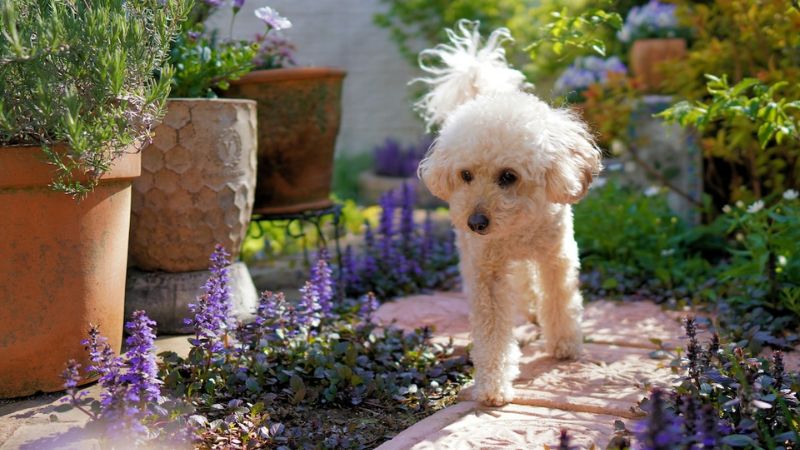In flower bed care, one of the biggest challenges gardeners face is controlling weeds without harming beloved flowers. Weeds not only destroy the aesthetics of flower beds but also compete with flowers for nutrients, light, and water, reducing their growth. So the weed killer for flower beds that won’t kill flowers? In this article, Garden Creatives will introduce some weed killer for flower beds that won’t kill flowers and natural remedies to help you keep your flower beds always green and vibrant.
Are herbicides harmful or not?
Herbicides help people kill weeds and absorb nutrients from the soil, causing plants to grow weakly. To quickly get rid of weeds, most people will use pesticides. However, farmers need to clearly understand how to use the product, store it safely, and handle it after killing weeds. So as not to affect human health and the environment.
It is completely wrong to say that herbicides are not toxic. It depends on the ingredients in the medicine and the process of using the herbicide.
Currently, to protect the health of users and the surrounding environment, manufacturers have prepared drugs that are highly environmentally protective and non-toxic to users.
Be careful when using herbicides Choose herbicides that do not harm plants with clear origin, origin, expiration date, ingredients, and uses for each type of grass.
Must prepare equipment to spray herbicides in accordance with the procedure such as protective clothing, spraying tools, rubber gloves, medical mask, hair towel, and specialized glasses.
Do not overuse herbicides as it will affect human health. At the same time, it makes the grass resistant to medicine, making it difficult to treat. Encourage the application of cover cultivation methods in planted areas. Plant plants that inhibit weeds. Kill weeds by pulling them by hand.
Choose the appropriate time to spray: when the grass has not yet germinated or has sprouted into a plant. Prioritize spraying herbicides when the weather is sunny and warm, without strong winds. Strictly follow the instructions for use and storage.
Weed killer for flower beds that won’t kill flowers
The herbicide that does not harm plants DC Organic CT5
Uses
Destroy grasses such as chicken grass, bear grass, betel grass,…
After spraying, the grass will dry on the ground and then decompose into humus. Helps soil increase porosity and retain moisture. Beneficial microorganisms and natural enemies stimulate growth. Earthworms maintain population density.
Using
Herbicides do not harm plants in your garden, industrial plants or fruit trees. Mix 1 liter of medicine with 100 liters of water and then spray it on the grass stems and leaves. Do not spray when it rains or close to the harvest date. Grass will die within 7-15 days.
Note
Be careful not to spray herbicides on leaves or young shoots as this will cause the plant to turn yellow. Mix the medicine with clean water. To increase effectiveness, add 1 liter of vinegar to it.
Fasfix 150SL herbicide
Uses
Eliminate grasses such as thatch grass, cage grass, poppy grass, betel nut, tasseled pampas grass, amaranth, purslane, stinging nettle,… Grass will be destroyed within 2-3 days after spraying.
How to use and notes
Mix 2-3 liters of plant-harmless herbicide Fasfix 150SL with 300-400 liters of water, and use to spray 1 hectare of land. Spray the grass foliage evenly to kill it quickly and thoroughly. Mix enough medicine to use, and shake well before spraying. Avoid spraying on green leaves and young shoots as it will affect other plants.
New generation herbicide BIOGLY 88.8 SP
Uses
Formulated with supporting herbs that develop quickly upon contact with the soil. Completely safe for the environment and does not harm plants. BIOGLY 88.8 SP penetrates the stem of the grass, then moves to other parts, causing the grass to die and making it difficult to regrow. BIOGLY 88.8 SP can kill grasses such as broad-leaved grass, narrow-leafed grass, thatch grass, jasmine, and leek,…
Using
Use 25-50 grams of non-harmful herbicide BIOGLY 88.8 SP mixed with 16 liters of water. Spray both sides of the grass leaves or spray the underside of the grass to immediately kill weeds.
Anti Grass non-harmful herbicide
Uses
Support growers in destroying annoying grasses such as bear grass, chicken grass, betel grass, etc. Helps earthworms multiply, increases porosity and keeps soil moist. Stimulates the production of beneficial organisms, microorganisms, and natural enemies that are beneficial to the plant.
Using
Mix Anti Grass 500ml with 80 liters of water. Depending on the type of grass and its density, mix the corresponding amount of medicine. The medicine is sprayed in the form of mist, evenly wetting the grass from stem to leaf. Especially the grassroots, completely destroy the grassroots.
Epilogue
Keeping flower beds clean and weed-free while still ensuring the safety of the flowers is not easy. However, with the weed killer for flower beds that won’t kill flowers safe herbicides, and natural remedies that have been introduced, you can be completely assured that your flower beds will always be beautiful and free from weeds. Always remember, taking care of flower beds is not only about beautifying the garden but also a way to show the gardener’s love of nature and patience and meticulousness.





